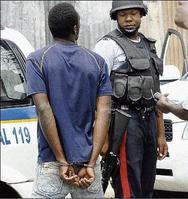
In this April 2000 file photo, police escort a man to the August Town Police Station after they could not ascertain his address during a flare-up in the community. The police routinely detain citizens without justification for long periods. - File The EDITOR, Sir:
IN YOUR editorial of July 24, 2008, ('More robust response to crime needed'), you endorse the prime minister's interference with habeas corpus as an effective anti-crime initiative. According to you, it is a "fact" that the police are generally able to identify violent criminals, but lack the "hard evidence" to prosecute them. You further claim that these violent criminals, if arrested, are often "quickly released", enabling them to "intimidate and frighten witnesses". On this basis, you support the "idea of a longer period of detention" to "allow the police more time to build their case against a suspect and to allow potential witnesses time and space with the immediate presence of the accused to decide whether they will give evidence".
crime control
On this basis, you support the detention of suspects for up to 72 hours, without the leave of the judiciary.
Your editorial reflects not only historical amnesia, but also spectacular contempt for and an ignorance of fundamental human rights and freedoms.
As has been well documented by your own newspaper, Jamaica has had long experience of abrogating human rights in the cause of crime control. A cursory review of available data should tell you that this modus operandi has never been effective. The Suppression of Crime Act, the Gun Court Act, and indeed, the 1976 State of Emergency, all exemplify this methodology. So have the raft of all-too-similar crime plans put forward in 2000, 2002, 2004, 2005 and 2007. Instead of rates of violent crime going down, the opposite has occurred.
In your haste to endow the police with great powers of detention, you (like the prime minister) conveniently ignore the notoriety of the police with respect to abusing citizens' rights, including arbitrary detention.
crime crisis
The police routinely detain citizens without justification, sometimes for months at a time, not merely days.
Routine abuse of citizens' rights has indirectly aggravated the crime crisis by undermining public confidence in the police, and, therefore, limiting the availability of actionable intelligence to the police. Giving the police 72 hours to 'build a case' clearly inverts the presumption of innocence, a concept that is alien to a democracy, but quite at home in a police state.
It is one thing to have your rights forcibly violated at gunpoint. It is quite another thing to allow the State to repress human rights in the cause of 'law and order'. History amply demonstrates that such repression produces neither law nor order. It most certainly does not produce justice.
I am, etc.,
O. Hilaire Sobers

